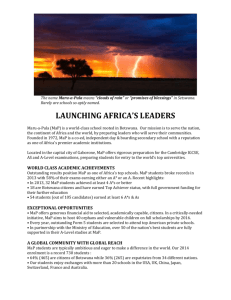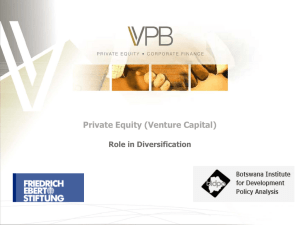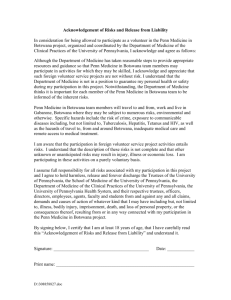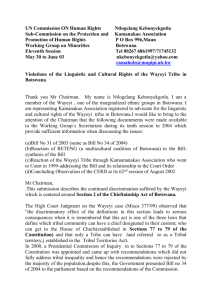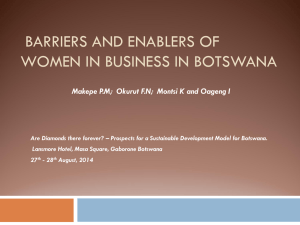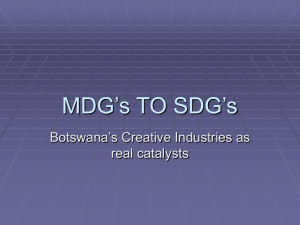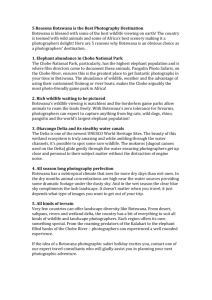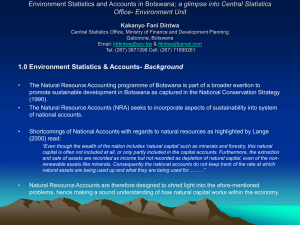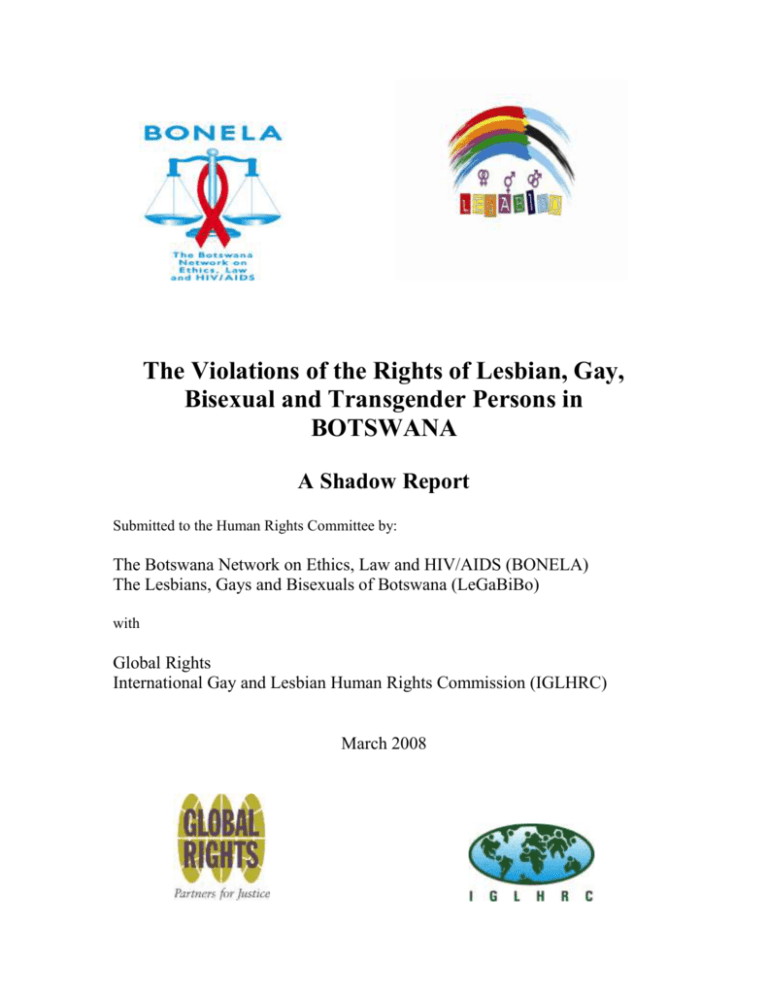
The Violations of the Rights of Lesbian, Gay,
Bisexual and Transgender Persons in
BOTSWANA
A Shadow Report
Submitted to the Human Rights Committee by:
The Botswana Network on Ethics, Law and HIV/AIDS (BONELA)
The Lesbians, Gays and Bisexuals of Botswana (LeGaBiBo)
with
Global Rights
International Gay and Lesbian Human Rights Commission (IGLHRC)
March 2008
ACKNOWLEDGEMENTS
This shadow report on lesbian, gay, bisexual, and transgender rights in Botswana was
coordinated by The Botswana Network on Ethics, Law and HIV/AIDS (BONELA) and
The Lesbians, Gays and Bisexuals of Botswana (LeGaBiBo), in partnership with Global
Rights and the International Gay and Lesbian Human Rights Commission (IGLHRC).
The research was conducted by Seema Pereira of the Pennsylvania State University, The
Dickinson School of Law, under the supervision of Professor Stephanie Farrior.
Executive Summary
Botswana is a party to the International Covenant on Civil and Political Rights (ICCPR)
following its accession on September 8, 2000. In addition, the Constitution of Botswana
establishes in its article 3 that “every person in Botswana is entitled to the fundamental
rights and freedoms of the individual, that is to say, the right, whatever his race, place of
origin, political opinions, color, creed or sex.”1 Furthermore, article 12(1) of the
Constitution states that “no person shall be hindered in the enjoyment of his freedom of
expression, that is to say, freedom to hold opinions without interference, freedom to
receive ideas and information without interference, freedom to communicate ideas and
information without interference (whether the communication be to the public generally
or to any person or class of persons) and freedom from interference with his
correspondence.”2 The constitutional protection of freedom of assemble and association
is established by article 13(1) that reads “no person shall be hindered in the enjoyment of
his freedom of assembly and association, that is to say, his right to assembly freely and
associate with other persons and in particular to form or belong to trade unions or other
associations for the protection of his interests.”3
Despite all of these constitutional and international protections, lesbian, gay, bisexual,
and transgender individuals in Botswana continue to face a denial of protection of basic
human rights based on their sexual orientation and gender identity and expression. As
the Human Rights Committee established in the landmark case of Toonen v. Australia4,
the prohibition of discrimination on grounds of sexual orientation is included in the
references to sex in the International Covenant on Civil and Political Rights (ICCPR).
Therefore, discrimination on the basis of sexual orientation is a violation of Articles 2(1)
and 26 (non-discrimination) of the ICCPR.
Botswana is in violation of several rights in the ICCPR with reference to its citizen
because of their sexual orientation or gender identity and expression. First, civil society
organizations that advocate for the rights of the LGBT (lesbian, gay, bisexual, and
transgender) community have been denied legal status because the Republic of Botswana
1
The Constitution of Botswana, Article 3.
The Constitution of Botswana, Article 12(1).
3
The Constitution of Botswana, Article 13(1).
4
Toonen v. Australia, Communication no. 488/1992, U.N. Doc CCPR/C/50/D/488/1992 (1994).
2
2
claims that the country’s constitution does not recognize homosexuals.5 The denial of
registration is a violation under ICCPR article 22, freedom of association. Another
violation of LGBT rights in Botswana is the state’s criminalization of same sex sexual
activity. The Human Rights Committee has declared laws that criminalize consensual
same-sex behavior to be in violation of the right to privacy guaranteed by the ICCPR.6
Although Botswana has committed to uphold the principles of the ICCPR, it has failed to
bring its criminal code into compliance with international principles, regarding criminal
penalties for same-sex conduct. Such laws violate international protections of the right to
privacy and protections against discrimination, and threaten basic freedoms of
association, assembly and expression. These laws violate Article 2, 26 (nondiscrimination), and 17 (right to privacy) of the ICCPR.
The overall culture in Botswana remains highly repressive in its attitudes towards LGBT
persons. Despite instances of discrimination against LGBT individuals in Botswana and
the fact that the ICCPR clearly prohibits such conduct, Botswana’s state party report
makes no mention of specific efforts to eliminate discrimination or protect the rights of
LGBT persons.7 Despite such lack of attention, Botswana continues to have an
obligation under the ICCPR to guarantee fundamental human rights to all persons,
including LGBT individuals. In presenting this shadow report, it is our goal that this
information will aid the Human Rights Committee in its evaluation of Botswana’s
adherence to the rights set forth in the ICCPR, and eventually lead to a genuine attempt to
protect and provide civil and political rights to LGBT persons in Botswana.
Substantive Violations of the Convention
Articles 2(1), 26 (Non-discrimination) and 17 (Freedom from Arbitrary
Interference with Privacy, Family, Home)
Articles 2(1) and 26 of the ICCPR set out the non-discrimination standards to which state
parties will be held. Article 2(1) establishes that the rights guaranteed within the
Covenant are guaranteed to all the citizens of each signatory country, “without distinction
of any kind, such as race, color, [or] sex.” Article 26 guarantees the right of all people to
equality before the law and equal protection of the laws and legal systems of each
signatory country. Discrimination in the law “on any ground such as race, color, [or]
sex” is likewise prohibited. Article 17 of the ICCPR establishes that “no one shall be
subjected to arbitrary or unlawful interference with his privacy, family, home or
correspondence”.
5
Letter from Department of Civil and National Registration to LeGaBiBO Society, dated September 10,
2007.
6
Toonen v. Australia.
7
Initial Report Submitted by Botswana to the Human Rights Committee, U.N. Doc CCPR/C/BWA/1, May
2, 2007.
3
In 1994, in Toonen v Australia,8 the Human Rights Committee considered the
criminalization of private sexual activity between consenting same-sex adults and found
that such laws violated Articles 2(1), 17, and 26 of the Covenant. According to the
Committee, the notion of sex in Articles 2(1) and 26 must be interpreted as including
sexual orientation.9 The Human Rights Committee held in Toonen that the term ‘sex’ is
to be read to include sexual orientation, meaning that persons regardless of their sexual
orientation are entitled to all of the rights guaranteed by the Convention and are to be free
from discrimination and guaranteed the equal protection of the law.10 The Toonen
decision has been referenced many times by the Committee, by other Treaty Bodies, and
by the UN Special Procedures when affirming that Articles 2(1) and 26 of the Covenant
prohibit discrimination based on sexual orientation.
The most egregious violation of LGBT rights in Botswana lies in the Botswana penal
code that still criminalizes same-sex sexual conducts in private between consenting
adults, which contravenes to Articles 2(1), 17, and 26 of the ICCPR.11 Section 167 of the
Penal Code Act, Chapter 8 of the Laws of Botswana, states that
“any person who, whether in public or private, commits any act of gross
indecency with another person, or procures another person to commit any
act of gross indecency with him or her, or attempts to procure the
commission of any such act by any person with himself or herself or with
another person, whether in public or private, is guilty of an offence.”12
Section 164 provides that
“Any person who- (a) has carnal knowledge of any person against the
order of nature; or (b) has carnal knowledge of an animal; or (c) permits
any other person to have carnal knowledge of him or her against the order
of nature; is guilty of an offence and is liable to imprisonment for a term
not exceeding seven years.”13
Similar to the Tasmanian statute outlawed by the Human Rights Committee in Toonen14,
section 164 punishes the crime of “unnatural offences,”15 and Section 164 punishes with
imprisonment for seven years the “attempt to commit unnatural offences.”16
In 1998, the process of revising the penal code raised prospects that the sodomy law
might be repealed. However, both political and religious forces intervened to block that
possibility. Politicians in Botswana defended sodomy laws based on the belief that
8
Toonen v. Australia, Communication no. 488/1992, U.N. Doc CCPR/C/50/D/488/1992 (1994).
Id.
10
Id.
11
Botswana Penal Code, Chapter 8:01.
12
Botswana Penal Code, § 167, Chapter 8:01.
13
Botswana Penal Code, § 164, Chapter 8:01.
14
Toonen v. Australia.
15
Botswana Penal Code, § 164, Chapter 8:01.
16
Id.
9
4
homosexuality represents both the antithesis of Botswana culture and a reflection of
Western influence. The then Assistant Minister of Labor and Home Affairs, Olifant Mfa,
claimed that homosexuality is “barbaric, whether you argue it from the perspective of
religion or culture.”17 Mr. Mfa went so far as to encourage such individuals “to go for
counseling and serious therapy so that they can be brought back to normality.” 18 He
considers homosexuality to occur when people ignore their religion and culture to suit
their absurd behavior.19 Mr. Mfa also stated that the reason that homosexuality is not part
of Botswana culture is because “even people who claim to be homosexual are afraid to
come out in the open.”20 Certainly, fear of being exposed to negative and discriminatory
treatment by political and religious forces keeps these individuals from coming out into
the open. It will continue to be difficult for the LGBT community to be open about their
sexual orientation if it constitutes a criminal offence. According to BONELA (The
Botswana Network on Ethics, Law and HIV/AIDS) and LeGaBiBO (Lesbians, Gays and
Bisexuals of Botswana), “Homosexuality has always been a taboo subject and society has
more often than not tried to hide the history of homosexuals.” Hardly anything positive
has ever spoken about gays and lesbians and their contribution to society.”21 Kgosi
Sediegeng Kgamane, a tribal authority, admitted that he was aware of such behavior in
the society; however, he said that homosexuality is not welcome in the Tswana custom
and is a kind of mental illness.22 LeGaBiBO responded by writing, “Homosexuality
cannot be cured simply because it is not a disease.”23 Kgosi Lotlaamoreng II, the
paramount chief of Barolong, claimed that there are no elements of homosexuality in
Botswana or other African societies.24 He is convinced that it is “alien behavior that
comes with foreigners.”25 BONELA responded to the Botswana Gazette’s representation
of homosexuality as “rubbish” by a letter stating: “We continue to advocate for the rights
of the lesbians, gays, bisexuals, transgendered and intersexed community because they
have long been here, contribute to the fabric of this country, and will long be here to stay.
Homosexuality is found all around Botswana, including in rural areas.”26
Hostility to homosexuals has been expressed numerous times by government officials.
The executive secretary of the ruling Botswana Democratic Party said his party “could
not even debate the issue of homosexuality” because it “would shock the Batswana
nation.”27 The Vice-president of Botswana, Seretse Ian Khama, also spoke out against
homosexuals,28 stating that “Human rights are not a license to commit unnatural acts
which offend the social norms of behavior ... The law is abundantly clear that
homosexuality, performed either by males or females, in public or private is an offence
17
Aubrey Lute, Homosexuality is rubbish--Mfa, The Botswana Gazette, May 24-30, 2006.
Id.
19
Id.
20
Id.
21
Letter from BONELA and LeGaBiBO to the Editor of The Botswana Gazette, dated May 29, 2006.
22
Aubrey Lute, Homosexuality is rubbish--Mfa, The Botswana Gazette, May 24-30, 2006.
23
Letter from BONELA and LeGaBiBO to the Editor of The Botswana Gazette, dated May 29, 2006.
24
Aubrey Lute, Homosexuality is rubbish--Mfa, The Botswana Gazette, May 24-30, 2006.
25
Id.
26
Letter from BONELA and LeGaBiBO to the Editor of The Botswana Gazette, dated May 29, 2006.
27
Id.
28
Id.
18
5
punishable by law.”29 Other traditional leaders, such as the late Bakgatla Kgosi Linchwe
II and Bangwaketse Kgosi Seepaapitso IV, have also opposed relaxing the penal code.30
Bangwaketse Kgosi Seepapitso IV told the Midweek Sun that people who are gay should
be whipped or sent to jail.31
African church leaders describe homosexuality as “unethical and unbiblical.” 32 The
Evangelical Fellowship of Botswana, a coalition of evangelical churches, launched a selfnamed “crusade” against homosexuality.33 Its national secretary, Pastor Biki Butale,
called on “all Christians and all morally upright persons within the four corners of
Botswana to reject, resist, denounce, expose, demolish and totally frustrate any effort by
whoever to infiltrate such foreign cultures of moral decay and shame into our respectable,
blessed, and peaceful country.”34
As a result of these political and religious influences, Botswana has not only retained its
criminalization of same-sex sexual acts between men, but, in 1998, expanded its laws to
criminalize sexual conduct between women.
In December 1994, an adult male citizen of Botswana, Utjiwa Kanane, was arrested and
charged with engaging in unnatural acts and indecent practices between males under
sections 164 and 167 of the Botswana Penal Code.35 Through a series of appeals and
other circumstances, this case lasted nine years, reaching the High Court on March 22,
2002.36 In this decision, the late Judge Mwaikasu upheld the constitutionality of Sections
164 and 167 of the Penal Code.37 The High Court further held that the “provisions of the
Botswana constitution that protect rights to privacy, association, and freedom of
expression could be curtailed by legislation enacted to support ‘public morality.’” 38 The
court included sexual intercourse among women as a criminal offence based on the
principle that there is no gender discrimination in the Penal Code.39
The case of Mr. Kanane went before the Court of Appeal in July 2003 as a constitutional
matter.40 The Court ultimately found that Botswana’s Constitution did not prevent gays
and lesbians from associating with each other “within the confines of and subject to the
law.”41 The Court of Appeal stated that it “does have indications before it that the time
29
Id.
Id.
31
Id.
32
Id.
33
Id.
34
More Than A Name: State-Sponsored Homophobia and Its Consequences in Southern Africa, Human
Rights Watch and The International Gay and Lesbian Human Rights Commission (available at
http://hrw.org/reports/2003/safrica/)
35
Kanane v. The State 2003, 2003(2) BLR 64 (CA).
36
Ditshwanelo: Gays, Lesbians, and Bisexuals of Botswana, available at
http://www.ditshwanelo.org.bw/gay.html
37
Id.
38
Id.
39
Id.
40
Kanane v. The State 2003, 2003(2) BLR 64 (CA).
41
Ditshwanelo: Gays, Lesbians, and Bisexuals of Botswana, available at
http://www.ditshwanelo.org.bw/gay.html
30
6
has not yet arrived to decriminalize homosexual practices even between consenting adult
males in private. Gay men and women do not represent a group or class which at this
stage has been shown to require protection under the Constitution.”42 The court referred
to a lack of evidence showing that public opinion has so changed or developed to warrant
such a change in legislation.43 According to the court, this decision reflects the interest of
the public, which “must always be a factor in the court’s consideration of legislation.”44
The effect of having legal penalties for same sex sexual conduct is that, even when they
are not enforced, these laws strengthen and reinforce social stigma and homophobia
against sexual and gender non-normative behavior, whether perceived or real, that may
easily cause discrimination or more serious forms of human rights abuses. That stigma,
in turn, can be even more effective than legal penalties in stripping individuals of the
economic, social, and political rights guaranteed to them under the ICCPR.45
On November 7, 2006, LeGaBiBo published a press release describing an individual who
was ejected from a local nightclub on the grounds that she was “a lesbian.”46 She was
simply standing on line for a drink, when a man who identified himself as the owner of
the club approached her.47 He proceeded to push her into the kitchen where he touched
her chest and said, “Identify yourself. Are you a man or a woman? We don’t allow
lesbians here.”48 She was then escorted off the premises by a security guard. 49 This
incident had no recourse because there is no law in Botswana that recognizes the rights of
non-heterosexual people. Therefore, reporting such an incident to authorities or police
will be to no avail because there is no Botswana legal instrument that recognizes
discrimination based on sexual orientation or gender expression.
On January 24, 2007, the Midweek Sun published an article titled “Homosexual teacher at
FSS?,” which described a teacher who was luring boys at a secondary school with cell
phones and money in exchange for homosexual sex.50 The article focused more on the
teacher’s homosexuality than on the abusive nature of teacher-student relationships.51
The article quotes a parent saying, “He might influence our children to accept
homosexuality.”52 This type of media attention creates greater discrimination because its
failure to effectively prevent discrimination creates dangerous stereotypes.53
42
Kanane v. The State 2003, 2003(2) BLR 64 (CA).
Ditshwanelo: Gays, Lesbians, and Bisexuals of Botswana, available at
http://www.ditshwanelo.org.bw/gay.html
44
Id.
45
See, J.S. Mill, On Liberty. “(T)he chief mischief of the legal penalties is that they strengthen the social
stigma. It is that stigma which is really effective…(it)is as efficacious as law; men might as well be
imprisoned, as excluded from the means of earning their bread.”
46
Group Condemns Act of Discrimination at Local Nightclub, Press Release published by LeGaBiBO,
November 7, 2006.
47
Id.
48
Group Condemns Act of Discrimination at Local Nightclub, Press Release published by LeGaBiBO,
November 7, 2006.
49
Id.
50
Ntibinyane Ntibinyane, Homosexual teacher at FSS?, Midweek Sun, January 24, 2007.
51
Letter from LeGaBiBO and BONELA to Editor of Midweek Sun, dated January 25, 2007.
52
Ntibinyane Ntibinyane, Homosexual teacher at FSS?, Midweek Sun, January 24, 2007.
53
Letter from LeGaBiBO and BONELA to Editor of Midweek Sun, dated January 25, 2007.
43
7
Notably, the law criminalizing same sex sexual conduct is also detrimental to Botswana’s
efforts toward HIV/AIDS education, prevention and care. In Toonen v Australia, the
Human Rights Committee noted that the criminalization of same sex sexual practices
“could not be considered a reasonable means or proportionate measure to achieve the aim
of preventing the spread of HIV/AIDS.”54 In fact, as the State party in that case
commented, “‘statutes criminalizing homosexual activity tend to impede public health
programs by driving underground many of the people at the risk of infection.’” 55 The
Committee concluded in Toonen that “(c)riminalization of homosexual activity thus
would appear to run counter to the implementation of effective education programs in
respect of the HIV/AIDS prevention. Secondly, the Committee notes that no link has
been shown between the continued criminalization of homosexual activity and the
effective control of the spread of the HIV/AIDS virus.”56
Articles 21 (Right of Peaceful Assembly) & 22 (Freedom of Association)
According to Botswana’s state report, the protection of freedom of association is
provided for under Section 13(1) of the Constitution.57 The ICCPR also guarantees the
right of association under Article 22 and the right of peaceful assembly under Article 21.
The only restrictions that may be placed on these rights are those that are necessary for
national security and public order or safety.
Botswana has violated these rights by denying groups and non-governmental
organizations the right to register and enjoy a formal, legal existence, based on
discriminatory grounds. The country has also violated these rights by offering no
protection to gays and lesbians subject to violence when they gather, socialize, or meet in
public places, including bars, pubs, and clubs. Due to the repressive laws enforced by
state officials in Botswana and the homophobic public statements and speeches delivered
by politicians, these rights continue to be violated in Botswana.
In Botswana, a human rights organization called Ditshwanelo has been defending and
advocating for LGBT rights for over ten years.58 As early as 1995, it urged
decriminalization of same-sex sexual conduct.59 It housed and provided legal aid to a
group of gays and lesbians who eventually founded an organization called LeGaBiBO,
which is currently the only organization in Botswana advocating for the rights of the
LGBTI community.60 Ditshwanelo organized a “roundtable on gay rights”61, producing a
54
Toonen v. Australia, Communication no. 488/1992, U.N. Doc CCPR/C/50/D/488/1992 (1994).
Id.
56
Toonen v. Australia, Communication no. 488/1992, U.N. Doc CCPR/C/50/D/488/1992 (1994).
57
Initial Report Submitted by Botswana to the Human Rights Committee, U.N. Doc CCPR/C/BWA/1, May
2, 2007.
58
More Than A Name: State-Sponsored Homophobia and Its Consequences in Southern Africa, Human
Rights Watch and The International Gay and Lesbian Human Rights Commission (available at
http://hrw.org/reports/2003/safrica/)
59
Id.
60
Id.
61
Id.
55
8
paper on the subject, which it submitted to the criminal law reform process in 1998.62 As
a result of this process, the organization was attacked by Bekezela Nkomo, of the
Evangelical Christian Fellowship, who described the Ditshwanelo as “infiltrated by gays
and lesbians with the set aim of desecrating traditional African moral values on the altar
of perceived constitutional rights.”63 In the same year, members of LEGABIBO met the
Attorney General, who informally conveyed to them that the organization would never be
allowed to register legally because same sex sexual conduct remained a criminal act.64
While it is true that some change has taken place in Botswana, the change is not
substantive. In late 2000, President Festus Mogae launched the Botswana Human
Development Report 2000 in which he urged the nation “not to be judgmental” about
groups vulnerable to HIV, including homosexuals, prisoners, and commercial sex
workers.65 At the same time, LeGaBiBO, the organization that represents and advocates
for such individuals continues to operate as an extralegal organization. By deciding not
to allow registration to this organization, the government is, in fact, denying the existence
of these individuals or their need for protection under the law. In addition, the NGO
operates under potential threat of government sanction because the government could, at
any time, move against the organization for operating extralegally. BONELA has housed
LeGaBiBo since 2005 and filed registration papers on behalf of LeGaBiBO with the
Registrar of Societies on September 27, 2006.66 The letter rejecting the application to
register LeGaBiBO is dated September 10, 2007, and is signed by Mabuse Pule, the
Acting Director in the Registrar of Societies’ office.67 The organization was denied
registration based on the principle that because the country’s constitution does not
recognize homosexuals, registering a gays and lesbians’ organization would contravene
the laws of Botswana.68 In addition to the Constitution, Botswana’s penal code
criminalizes same sex sexual activities under unnatural offenses, which carry a maximum
of seven years’ imprisonment.69 Mr. Pule also referenced the Botswana’s Societies Act
Section 7(2) (a) which says that any of the objects of the society is, or is likely to be used
for any unlawful purpose or any purpose prejudicial to or incompatible with peace or
good order in Botswana.70
In 2005, the Botswana Network of AIDS Service Organizations [BONASO] gave grants
to youth organizations through District MultiSectoral AIDS Committees [DMSAC] and
Gaborone DMSAC denied funding to a youth AIDS outreach project that was to be
62
Id.
Id.
64
Id.
65
More Than A Name: State-Sponsored Homophobia and Its Consequences in Southern Africa, Human
Rights Watch and The International Gay and Lesbian Human Rights Commission (available at
http://hrw.org/reports/2003/safrica/)
66
Letter from Department of Civil and National Registration to LeGaBiBO Society, dated September 10,
2007.
67
Id.
68
Id.
69
Botswana Penal Code, § 164, Chapter 8:01.
70
Letter from Department of Civil and National Registration to LeGaBiBO Society, dated September 10,
2007.
63
9
implemented by LeGaBiBo since “homosexuality is illegal in the country.”71 Botswana
has an adult seroprevalence of 24.1%, which makes it the country with the highest HIV
rate in the world.72 By refusing to provide critically needed assistance to same-sex
practicing people in Botswana, “homophobia continues to trump the government’s
commitment to funding effective, science-based HIV prevention initiatives.”73
As recently as March 24, 2007, Anglican women in Botswana held a dialogue on
homosexuality in which the intention was supposedly to create a dialogue where different
views could be shared.74 However, for the most part, it was a “monologue” of speeches
against the acceptance of LGBTs.75 “People who were supportive of gays and lesbians
were not allowed to speak, or, when they did get a chance to say something, they were
cut short before they could finish their point.”76 Those speakers who did have an
opportunity to speak quoted the Bible often and made many references to sodomy.77
Concluding Notes and Observations
The laws of Botswana that criminalize any form of consensual same-sex conduct
between consenting adults provide for the possibility of imprisonment for seven
years. Beyond establishing a legal ground for the deprivation of life, liberty, physical
integrity, health, and opportunity, these laws preserve ingrained stereotypes about
LGBT individuals and, in effect, serve to reinforce and strengthen social stigmas
against them. Ultimately, these laws are in conflict with Articles 2(1), 17, and 26 of
the ICCPR.
The discriminatory culture against LGBT individuals in Botswana denies these
persons of their right to freedom of association and further limits the possibility of
providing education, prevention and care programs to individuals with HIV/AIDS.
Anti-discrimination legislation, directed specifically at LGBT rights, is needed.
71
Cary Alan Johnson, Off the Map: How HIV/AIDS Programming is Failing Same-Sex Practicing People
in Africa, International Gay and Lesbian Human Rights Commission, 2007 (available at
http://www.iglhrc.org/files/iglhrc/otm/Off%20The%20Map.pdf).
72
Id.
73
Id.
74
Prisca Mogapi, Anglican women in Botswana hold a dialogue on homosexuality, BONELA.
75
Prisca Mogapi, Anglican women in Botswana hold a dialogue on homosexuality, BONELA.
76
Id.
77
Id.
10
Detailed Recommendations to the Government
Botswana to refrain from statements that incite division, hatred, violence, and
discrimination based on sexual orientation or gender expression or identity.
To repeal so-called “sodomy laws,” or laws that criminalize consensual, adult,
homosexual acts. In particular,
o Botswana should repeal Sections 164, 165, and 167 of its Penal Code.
To end discrimination in the provision of health care by ensuring that gay, lesbian,
bisexual, transgender, and intersexed people as well as all other vulnerable groups
have access to relevant, population targeted and appropriate information on health,
including information on sexual health and HIV/AIDS.
To enact laws protecting against discrimination on the basis of sexual orientation or
gender identity or expression.
In future processes of constitutional revision, to include provisions that:
o Affirm or strengthen the right to privacy;
o Strengthen anti-discrimination protections, and include sexual orientation and
gender identity or expression in their scope;
o Eliminate any exemption from equality protections for customary laws or
traditional practices.
Proposed Questions for the Government Delegation
What steps is the government to take to ensure that LGBT organizations are not
denied registration?
Has the government considered repealing the laws that criminalize same sex sexual
conduct?
● Why has the government failed to mention any issues regarding discrimination against
LGBT persons in its state party report?
Is the government providing HIV/AIDS education targeted to people who have sex
with partners of the same sex as well as of the opposite sex?
Has the government inquired into the issue of discrimination against LGBT people
affected by HIV/AIDS?
11

